Beyond reason: What really motivates our choices
This essay was originally published at WND.com on February 25, 2016.
A few years ago I used to write for WND under the pen name David Hanson. I derived the name in honor of my maternal great-great-great, etc. grandfather John Hanson, the first president of the Continental Congress under the Articles of Confederation.
Besides being easier to spell, it was a tip of the hat to the familial and philosophic connection I had to our nation’s founding. It fit stylistically with how I wanted to frame the underlying theme of my editorials: Conservatives, especially Christians, should embrace classical liberalism – very close to today’s libertarianism – to be consistent with the founding spirit of our nation. I thought it was the best rhetorical strategy for communicating the tenets of liberty, self-reliance, localism and a foreign policy of strategic independence.
The problem was I discovered my scope and strategy were too narrow to truly address the gravity of the problems we face as a country. The scope of my project concerned conservatives and evangelicals – particularly those most prone to the allure of neoconservative promises that dominate Republican platforms: heavy on patriotic pleas but always resulting in big government at home and abroad.
My verbal strategy was one of appeals to the founders and constitutional principles to scratch the “patriotic itch” of middle America traditionalists better than the cynical ploys of establishment Republicans. This sincere strategy received great feedback but ultimately failed to sustain my interest and rightfully so: it only scratched the surface of what truly moves people.
The most successful political movements and candidates of any party have one thing in common: They serve as a vicarious vessel through which people can collectively mirror their desires and identity. They do not appeal to reason but only the form and fashion thereof. Rational philosophical argument will win you accolades in political junkie circles, but it doesn’t actually move people. Right reasoning is not the ultimate catalyst of our choices in life, especially those rituals we do in groups like voting.
Rather, it is our desires, our loves and fears, those matters of the gut that utterly attract or repulse us to things or people: Those are forces that shape our decision-making. Reason is really the cherry on top of our being, a surfboard we must align just so to ride the wave of our full being as it comes into shore. We use reason to justify and confirm our desires for our running internal self-narrative.
I could use philosophy and constitutional arguments to get the heads of political nerds nodding, but what about using words to truly be with people where they were: amidst their suffering, their hopes, their fears? What could Thomas Jefferson quotes do for them? How does converting someone to the elegance of Austrian economic theory help them be a better neighbor? How does cherry-picking Bible verses to enhance my connection to Christians inspire imitation of the spirit behind those texts?
We’re not robots; we humans need meat on the bones of our reason. We need flesh and blood. We need culture.
The founders understood this to some degree but not enough. Children of the Enlightenment, they had too much faith in the power of reason as the key to maximizing well-being. They did understand the human desire for power can lead to very brutal consequences. This skepticism led to dispersion of power through decentralized state systems, first with the Articles of Confederation and then, to a lesser extent, the Constitution. But their faith in reason produced a social contract state that has utterly devoured its own social contract.
The Constitution’s vision of a ruling intelligentsia that would play by the rules of a game they themselves were exclusively tasked with enforcing has proven to be a noble failure.
Blinded by their faith in reason, the colonial aristocracy thought a social contract between reasonable adults would maintain its spirit of preventing profane violence and chaos with a tiny dose of supposedly sacred violence – righteous collective force – divided among competing branches of government.
We still have the form of the Constitution – we maintain three federal branches that carry out their operational functions – but we completely lost its spirit. The chaos of central planning and violence unleashed by a central state, itself a monopoly of sacred violence, is rampant in our culture. The line between sacred violence and profane violence continues to blur.
Peace and order seem far away in our republic – now a vast bureaucratic empire. Hyper-mirroring factions vie for a piece of the state monopoly’s sacred violence to use in their favor to the exclusion of their favorite rival identity group.
We see victims everywhere, especially ourselves, but we cannot agree as a society who all the victims are and how to stop cycles of vengeance endemic to victimization. We all have our pet scapegoats we refuse to let go. Perhaps we need to rethink how deep our problems go. Beyond reason.
It is religion that moves us, whether we acknowledge it or not. The Latin root of religion is “to bind” and that’s precisely what it serves as: a binding agent for civilization. The cultures it produces shape our desires, which manifest as the political chaos we have before us. It is who we imitate not what we mentally ascent to that will heal or destroy our culture.
In that spirit, I respectfully retire the David Hanson moniker and its homage to the individualistic rationalism of the founding era. In its stead, I resume as my given name, David Gornoski, with a renewed focus on religion as the key to understanding the challenges we face and the way to overcome them.
There is a choice before us as neighbors and society:
Be like Jesus or self-destruct.

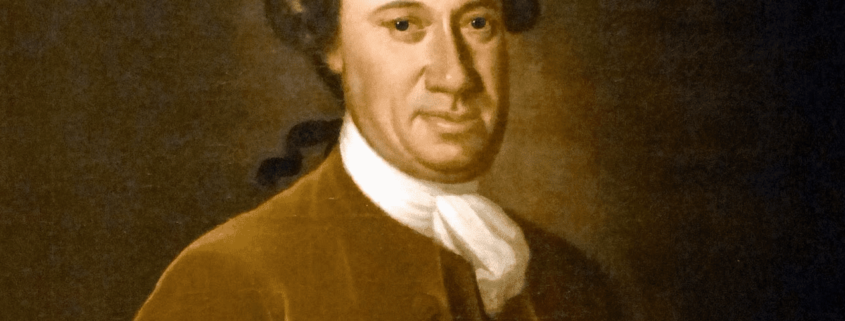
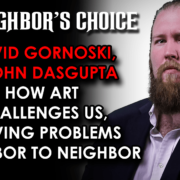
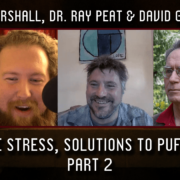
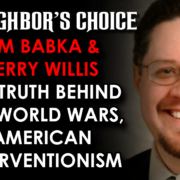
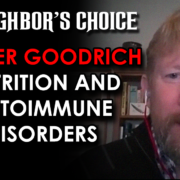
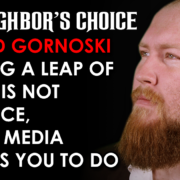
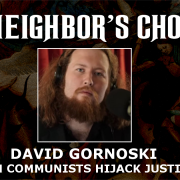
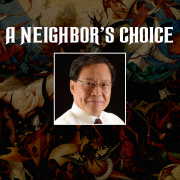
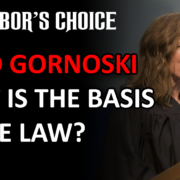


Leave a Reply
Want to join the discussion?Feel free to contribute!